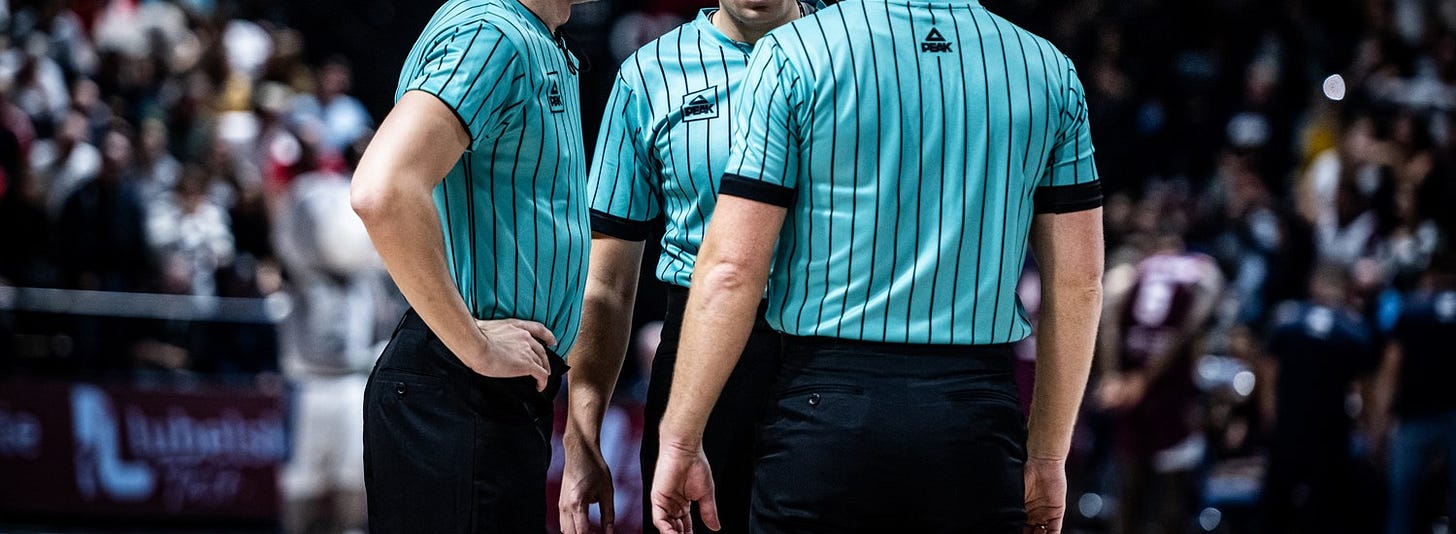Best Practices for Pre-Game Warm-Up
Learn the best practices for pre-game warm-up including important do's and dont's for optimal performance on the court
Understanding the significance of warming up is fundamental, yet often overlooked. Establishing a structured routine can make all the difference when it comes to game time preparation. Your warm-up serves as specific groundwork for the demands of the forthcoming match. Here, we present the essential "Do’s" and "Don’ts" of pre-game warm-up tailored for basketball referees.
The Don’ts
Neglect Specificity – Avoid including generic exercises in your warm-up routine. Tailor your warm-up to the specific demands of basketball officiating to maximize its effectiveness.
Overemphasize Static Stretching – While static stretching has its benefits, relying too heavily on it during warm-up can reduce muscle activation and hinder performance. Balance static stretching with dynamic movements to prepare your body adequately. Stretching exercises should only be performed after an active general warm-up.
Rely Solely on Foam Rolling – While foam rolling can be beneficial for muscle recovery, don't rely solely on it as your primary warm-up activity. Incorporate dynamic exercises that engage your muscles and raise your heart rate.
Neglect Mental Preparation - Don’t overlook the importance of mental preparation before officiating. Avoid entering the court without mentally visualizing your role, anticipating game scenarios, and fostering a positive mindset.
Push Beyond Limits - Avoid pushing yourself excessively during warm-up, risking fatigue or injury before the game even begins. Listen to your body and adjust the intensity of your warm-up accordingly. Aim to break a light sweat during warm-up without heavy breathing.
Ignore Feedback - Don’t disregard signals from your body during warm-up. Pay attention to any discomfort or tightness and adjust your routine to prevent potential injuries.
Skip Warm-Up - Avoid skipping warm-up due to time constraints or complacency. A proper warm-up is essential for priming your body and reducing the risk of injuries.
The Do’s
Incorporate Multi-Directional Movements – Include exercises that prepare you to move in all directions, such as lateral shuffles, crossover steps, and backward running. Basketball officiating requires agility and quick changes in direction, so your warm-up should reflect this.
Gradually Increase Intensity – Start your warm-up with low-intensity general warm up activities like jogging or brisk walking to raise your heart rate gradually. Then, progressively increase the intensity with exercises like high knees, butt kicks, and sprint drills to prepare your body for the demands of officiating.
Prioritize Sprinting – Integrate sprinting drills into your warm-up routine to simulate game-speed situations. Focus on short bursts of maximal effort sprints to condition your body for the fast-paced nature of basketball officiating.
Activate Leg Muscles - Incorporate exercises that activate and strengthen your leg muscles, such as lunges, leg swings, and calf raises. Strong legs are essential for quick movements and changes in direction on the court.
Include Balance Exercises - Integrate balance exercises like single-leg stands, ankle circles, and toe taps to improve stability and proprioception. Enhanced balance helps prevent injuries and allows for better control during officiating.
Focus on Dynamic Mobility - Prioritize dynamic mobility exercises that target your joints and muscles, such as arm circles, hip rotations, and leg swings. Dynamic mobility enhances flexibility and range of motion, reducing the risk of strains and sprains during officiating movements.
Practice Mental Rehearsal - Dedicate time during warm-up to mentally rehearse key officiating scenarios, visualizing yourself making accurate calls and effectively managing game situations. This mental preparation enhances focus, confidence, and decision-making on the court.
Conclusion
As basketball officials, the importance of a well-rounded warm-up routine cannot be overstated. By adhering to the "Do's" and avoiding the "Don'ts" outlined in this guide, you can ensure that your warm-up effectively prepares you for the physical and mental demands of officiating on the court.
It's crucial to remember that every individual is different, and what works for one person may not work for another. Therefore, it's essential to tailor your warm-up routine according to your unique physical condition, strengths, and limitations. Whether you're an experienced referee or just starting your officiating journey, investing time and effort into crafting a personalized warm-up routine will undoubtedly pay dividends in your performance and injury prevention efforts.
To further enhance your understanding and implementation of effective warm-up strategies, consider exploring the following additional resources:
Article: "The Science of Warm-Up" - This comprehensive article delves into the scientific principles behind warm-up routines and provides practical tips for maximizing performance and minimizing injury risk.
Article: “Warm-up and Stretching Tips for Officials” - This article presents a thorough exploration of the significance of appropriate warm-up and stretching routines for sports officials, with a focus on injury prevention and performance enhancement. It underscores various warm-up methods, such as passive, active general, and active specific warm-ups, outlining their advantages and disadvantages.
Book: "The Warm-Up: Maximize Your Performance and Prevent Injury" by Dr. Ian Jeffreys - In this book, Dr. Jeffreys, a renowned sports scientist, offers a detailed exploration of warm-up protocols tailored for various sports, including basketball officiating. From dynamic stretching techniques to mental preparation strategies, this resource covers all aspects of warm-up optimization.
By incorporating insights from these resources into your warm-up routine, you'll be better equipped to perform at your peak on the court while minimizing the risk of injuries. Remember, your warm-up is not just a prelude to the game—it's a critical component of your officiating success.



